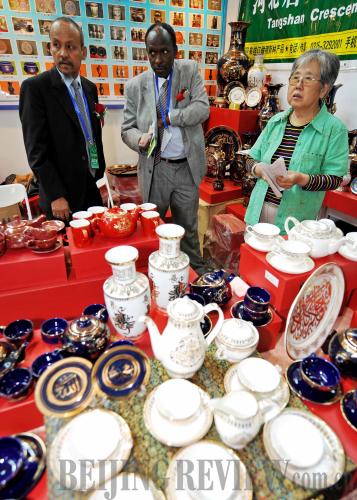|
 |
|
ALL THINGS ARAB: Foreign buyers look at Muslim products at the 2008 China (Ningxia) Halal Food and Commodities Festival held in Yinchuan, capital city of northwest Ningxia Hui Autonomous Region (WANG PENG) |
For centuries, northwest China's Ningxia Hui Autonomous Region was a prominent fulcrum on the Silk Road, an ancient trade route linking China and the Western world via the Middle East. Today, it is reclaiming its place as an economic hotbed in the country's northwestern regions.
"Ningxia's economy has been growing at double-digit rates in the past 10 years, drawing strength from coal resources and hefty government support," said Wang Zhengwei, Chairman of Ningxia Hui Autonomous Region.
The eonomic take-off is catapulting Ningxia onto the global stage. Yinchuan, capital of Ningxia, will hold the first Sino-Arab Economic and Trade Forum in September 2010, providing a bridge between Chinese and the Arab businesses.
The forum is expected to help accelerate Sino-Arab trade and economic cooperation in a string of fields such as energy, manufacturing, labor services and tourism. It will become a long-term mechanism and be held each year.
During the forum, the 2010 China (Ningxia) International Investment and Trade Fair will also be held in Yinchuan, adding luster to the economic landscape of the region. The fair in 2009 witnessed 105 investment deals worth 134.3 billion yuan ($19.8 billion).
Wang Jianmin, Deputy Director of the Development and Reform Commission of Ningxia said the forum will include meetings, commodity shows and an international halal food festival.
The events will cover four main topics: Sino-Arab investment and trade facilitation and trade development prospects; prospects for project contracts and labor service cooperation; tourism and cultural development; and training of professionals for economic, trade and technological cooperation.
At least 7,000 government officials, entrepreneurs and scholars will be invited to the forum, said Wang Jianmin.
He added that China and Arab countries are highly complementary in economic development. While Arab economies leverage rich resources and capital strength, Chinese companies enjoy mature technology and market experiences.
Wang Zhengwei said vigorous efforts are being made to get ready for the forum, including transportation, hotels, security and volunteer recruitment. The first passenger air route between Yinchuan and Dubai will open later this year.
In another move, the region has already started a massive promotional campaign to bolster the influence of the forum. Besides this, an academic seminar will be held before the forum, open to opinions from economists and businessmen about trade relations between China and Arabian nations.
Magic carpet
The Arab world and China have a legacy of trade ties going back 20 centuries when trade caravans packed with spices and silk crossed the Eurasian land mass along routes collectively known as the Silk Road. Such historic bonds are being revitalized in a torrent of trade and investment in energy, manufacturing and infrastructure.
In 2009, bilateral trade between China and the Arab states reached $107.4 billion, compared with $36.4 billion in 2004. Mutual direct investment also blossomed, surging from $1.1 billion in 2004 to $5.5 billion in 2009, said the Ministry of Commerce.
"But we still have a long way to go," said Wang Zhengwei. "China accounted for only 10 percent of the total foreign trade of the Arab countries, so there's still great potential for the business to grow."
| 